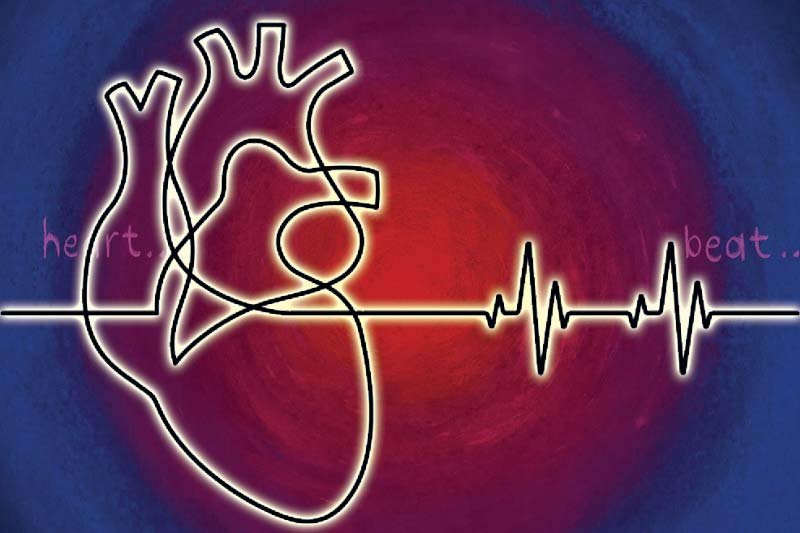Ventricular ectopia, or ventricular ectopic beats, is the medical term for premature ventricular contractions, or PVCs. It is a form of heart arrhythmia, sometimes called extrasystole. Almost everyone experiences them once in a while, especially as we grow older. However, this condition can indicate a serious, life-threatening problem. Let’s learn about the symptoms of this condition, its causes and the treatments that are available.
The Symptoms of Ventricular Ectopia
The main symptom many patients detect is the sensation of a skipped heartbeat, though some feel an extra strong heartbeat instead. In healthy patients, the issue should pass once someone has calmed down. The heartbeat cycle should reset after the premature ventricular beat, and that’s the moment where the person feels as if their heart has stopped. A few people may feel like their heart is fluttering or they have a sensation of “butterflies” in their chest. They tend to feel it when they’re under physical or emotional stress. Ventricular ectopia can also cause dizziness and shortness of breath.
Some patients experience these premature heart beats when they’re at rest or at night. This is because your heart rate is lower when you’re at rest or starting to fall asleep. In these cases, your heart has more time between beats for ectopic beats to occur. Disturbed sleep and tiredness can trigger the irregular heartbeats.
Isolated ventricular ectopia or premature beats does not affect the beating of the heart, but it can be dangerous if you have a heart problem or they are occurring frequently. When someone already has a structural heart disorder, the ventricular ectopia can become ventricular fibrillation or ventricular tachycardia; these can cause sudden death.
Don’t ignore unusually strong heart beats or the feeling your heart has literally skipped a beat. Consult with a doctor. The condition is formally diagnosed via electrocardiography, or ECG. A cardiac MRI may be done to confirm that your heart has a normal structure or to rule out heart muscle disease.
The Causes of Ventricular Ectopia
Ventricular ectopia is somewhat common, and age is a risk factor for it. In fact, menopause and hormonal changes during pregnancy can cause ectopic heart beats. However, this condition can be a side effect of serious cardiovascular problems. For example, it may be caused by coronary artery disease whether during or after a heart attack. Conditions like heart valve disorders and heart failure can cause ventricular ectopia as well. In rare cases, a viral infection of the lining of the heart causes PVCs.
Lifestyle choices may also be behind the reason why you may have developed ventricular ectopia. For instance, regularly engaging in high intensity exercises can exacerbate the condition. People who often engage in high adrenaline activities or extreme sports may also experience ventricular ectopic beats from time to time.
Stress can also be a triggering factor and so are things like excessive caffeine, alcohol, or illegal stimulants. If the condition persists, then it could be a sign of something more serious, such as a chemical imbalance, heart disease, or a heart muscle injury that may have been caused by either high blood pressure, an infection, or an underlying form of heart disease. This is why it’s essential that you see a doctor as soon as you experience repeated ventricular ectopic beats if you don’t want the symptoms to aggravate and to identify any underlying issues before they lead to complications.
The Treatments for Ventricular Ectopia
For some patients, simply avoiding things that trigger the condition like alcohol, caffeine and stress is enough to treat the condition. Patients with the condition may be advised to avoid cold and allergy medications that stimulate the heart. Doctors typically tell patients to stop smoking and refrain from using illegal drugs, especially stimulants.
Drug therapy is occasionally used, though the side effects of these drugs are sometimes worse than the benefits patients receive. The exception to this rule is patients who have had a heart attack or whose ventricular ectopia was caused by heart failure. In these patients, beta blockers improve their odds of survival. If the ectopic beats continually originate from one site, then catheter ablation may be necessary.
Regardless of what triggered this condition, talk to an experienced medical professional to understand what is best for you. The Heart Clinic in London, for example, only deals with heart patients. Their cardiologist Dr Syed Ahsan specialises in ventricular ectopics treatment. He’s an award winning specialist who will be able to establish if there is a potentially serious underlying cause of the premature ventricular ectopia or if lifestyle changes are sufficient. He’ll also run blood tests to determine if issues like abnormal electrolyte levels are to blame.
Ventricular ectopia is often managed with modest changes in lifestyle. However, advanced treatment methods are available to those who require more.
Related Videos about Ventricular Ectopia :
Mayo Clinic Treatment of Irregular Heart Beats – A Patient’s Perspective
Premature Ventricular Contraction – causes, symptoms, diagnosis, treatment, pathology
Are ectopic heart beats dangerous?
The Ventricular Ectopic – What every physician should know
Cardiologist draws and explains the ECG of a ventricular ectopic beat
Why pvcs, pacs, and ectopic heartbeats hurt so bad
Ventricular Ectopia – Causes, Symptoms and Treatments
ventricular ectopy normal range, ventricular ectopic beats ecg, ventricular ectopics treatment, how to stop ectopic beats, ectopic beats anxiety, supraventricular ectopy meaning, ectopic heartbeat anxiety, ectopic heartbeat exercise,




